Bringing a new puppy into your home is an exciting time, filled with joy, playfulness, and the rewarding experience of watching them grow. Just like human babies, puppies have unique and rapidly changing nutritional needs that are crucial for their healthy development. Providing the right diet during these formative months can lay the foundation for a lifetime of health and vitality, preventing common issues and supporting robust growth in bone, muscle, and cognitive functions. Navigating the vast array of options available in the pet food market can be overwhelming, especially when seeking the perfect “Top Breed Puppy Dog Food Review” to guide your decision. Many factors, from breed size to specific dietary sensitivities, play a significant role in determining what truly constitutes the best choice for your furry companion. Our aim is to simplify this complex process, providing a comprehensive guide to help you make an informed decision, ensuring your puppy receives the optimal nutrition they deserve.
Understanding Your Puppy’s Unique Nutritional Needs
A puppy’s first year of life involves an incredible amount of growth and development, making their nutritional requirements distinctly different from those of an adult dog. This period of rapid change demands a diet rich in specific nutrients to support everything from skeletal development to immune system strength.
The Dynamics of Puppy Growth: Rapid Development and Energy Demands
From tiny newborn to energetic adolescent, puppies undergo phenomenal physical and mental growth. Their bodies are building new cells at an astonishing rate, which means they need significantly more calories, protein, and other essential nutrients per pound of body weight than adult dogs. This high metabolic rate fuels their boundless energy for playing, learning, and exploring the world around them. An insufficient diet during this critical window can lead to developmental issues, poor immune function, and compromised adult health. It’s not just about quantity; it’s about the quality and balance of nutrients to support this intense period of development.
Breed-Specific Considerations: Tailoring Nutrition for Large and Small Breeds
The term “top breed” often encompasses a wide range of sizes and growth rates, each with distinct dietary needs.
- Large and Giant Breed Puppies: These breeds, such as German Shepherds, Labradors, and Great Danes, are prone to orthopedic problems like hip and elbow dysplasia if they grow too quickly. Their food requires carefully controlled levels of calcium and phosphorus, as well as moderate fat and protein, to promote slow, steady growth rather than rapid weight gain. This helps their bones and joints develop properly.
- Small and Toy Breed Puppies: Breeds like Chihuahuas, Poodles, and Pomeranians have tiny stomachs and high metabolisms, making them susceptible to hypoglycemia (low blood sugar) if they don’t eat frequently enough or consume calorie-dense food. Their food should be nutrient-rich with smaller kibble sizes that are easy for them to chew and digest.
Essential Nutrients for Optimal Puppy Health
Regardless of breed, all puppies require a specific blend of macronutrients and micronutrients for optimal health:
- High-Quality Protein: Essential for building strong muscles, tissues, and a healthy immune system. Look for animal-based proteins like chicken, beef, lamb, or fish as primary ingredients.
- Healthy Fats: Provide concentrated energy, support healthy skin and a shiny coat, and are crucial for brain and vision development. Omega-3 fatty acids, particularly DHA (Docosahexaenoic Acid), are vital for cognitive function.
- Balanced Carbohydrates: Offer sustained energy and dietary fiber for digestive health. Sources like sweet potatoes, peas, and brown rice are often preferred over corn or wheat, especially for sensitive stomach puppy food.
- Vitamins and Minerals: A wide range of vitamins (A, D, E, B-complex) and minerals (calcium, phosphorus, zinc) are necessary for everything from bone formation to immune response. The correct calcium-to-phosphorus ratio is particularly critical for large breed puppies.
Key Factors in Our Top Breed Puppy Dog Food Review
When evaluating puppy food, we focus on several critical aspects to ensure it meets the highest standards for growing dogs. These factors, informed by veterinary nutrition guidelines and practical experience, help us distinguish truly superior options.
Quality Ingredients: Human-Grade vs. Feed-Grade
The foundation of any good dog food is its ingredients. “Human-grade” ingredients meet the same standards for processing, inspection, and handling as food for human consumption, often indicating a higher level of quality and safety. In contrast, “feed-grade” ingredients are allowed to contain by-products, rendered meats, or other components not deemed fit for human consumption, though still legally safe for animals. For puppies, especially those from top breeds, prioritizing food made with human-grade or high-quality feed-grade ingredients ensures they receive pure, wholesome nutrition free from questionable fillers or artificial additives. Ingredients should be identifiable and sourced from reliable suppliers.
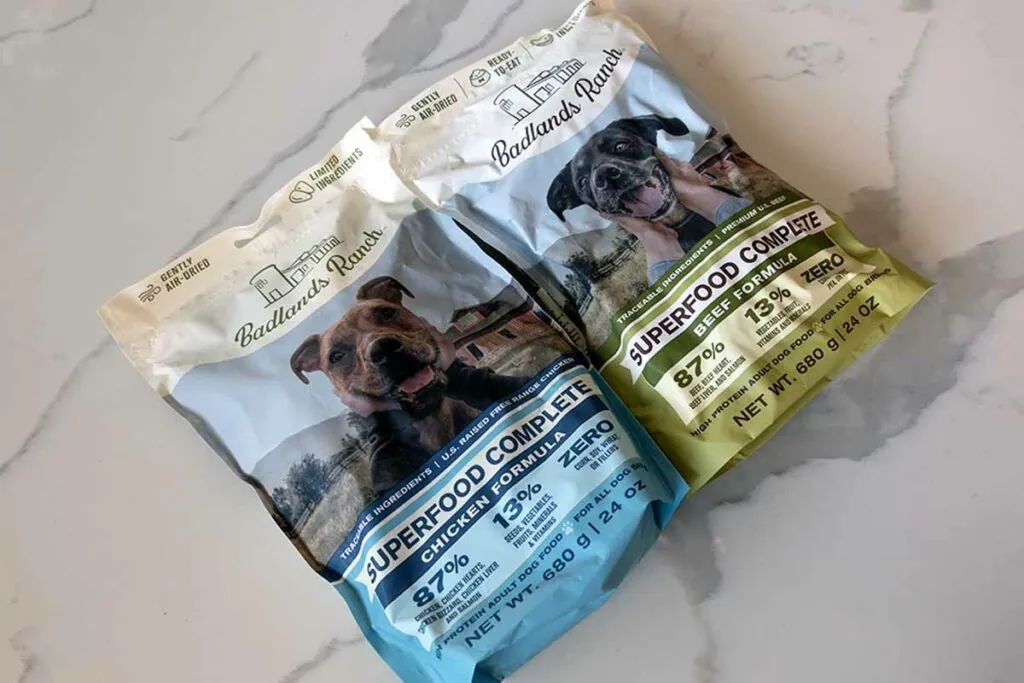 Premium ingredients in top breed puppy dog food
Premium ingredients in top breed puppy dog food
Balanced Macronutrients: Protein, Fat, and Carbs
The ideal balance of protein, fat, and carbohydrates varies slightly depending on breed size and activity level but is critical for puppy growth.
- Protein: Puppies need a higher percentage of protein (typically 25-30%) than adults to support rapid tissue growth.
- Fat: Fats provide energy and aid in nutrient absorption, usually making up 10-25% of a puppy’s diet. Essential fatty acids like Omega-3s are crucial for brain and vision development.
- Carbohydrates: Provide easily digestible energy. Complex carbohydrates are preferred for sustained energy release.
Look for formulas that clearly state these percentages and use digestible sources.
Digestibility and Gut Health Support
Puppies, particularly during transitions or stress, can have sensitive digestive systems. Highly digestible food reduces strain on their gut and ensures maximum nutrient absorption. Ingredients like prebiotics (e.g., chicory root) and probiotics (e.g., Lactobacillus) can support a healthy gut microbiome, which is vital for digestion and immune function. Gentle cooking methods, like air-drying or slow baking, can also preserve nutrient integrity and enhance digestibility, contributing to a healthy and comfortable digestive process for your puppy.
 Inside a bag of air-dried puppy food, showcasing texture
Inside a bag of air-dried puppy food, showcasing texture
Specialized Formulations: “Superfoods” and Developmental Boosts
Many premium puppy foods incorporate “superfoods” – nutrient-dense ingredients like blueberries, kale, chia seeds, and sweet potatoes – which provide a concentrated source of vitamins, minerals, and antioxidants. These can boost overall health and immune function. Additionally, specific supplements like DHA (often from fish oil) are vital for cognitive development and vision, especially in the first few months of a puppy’s life. Glucosamine and chondroitin can also be beneficial for larger breeds to support joint health as they grow, though typically these are more emphasized in adult large breed formulas, foundational support can start early.
Palatability and Texture: Appealing to Picky Eaters
Even the most nutritious food is useless if your puppy won’t eat it. Puppies can be picky, so palatability is key. Many premium brands focus on creating flavors and textures that appeal to puppies, often with smaller kibble sizes. Some air-dried or freeze-dried options offer a “treat-like texture” that can be highly appealing, even to the most discerning puppy palates, ensuring they consume the vital nutrients. If your puppy is a fussy eater, considering options known for their appealing taste and texture can be a game-changer.
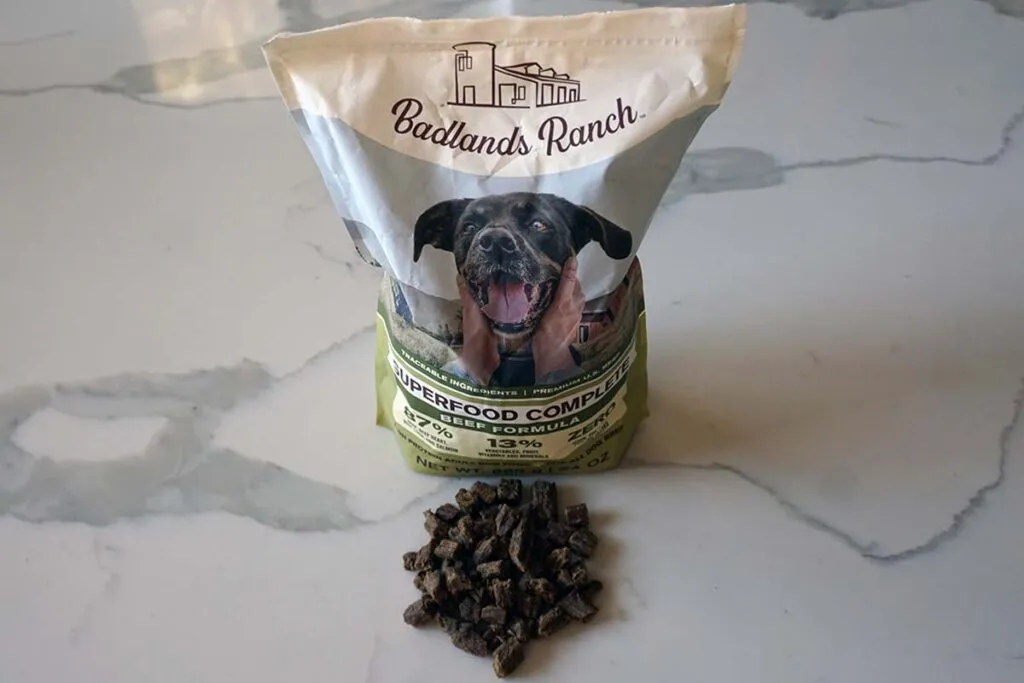 Picky puppy eating high-quality dog food with enthusiasm
Picky puppy eating high-quality dog food with enthusiasm
Convenience and Storage
For busy pet parents, the convenience of a puppy food formula is a major plus. Options that are easy to store, measure, and serve can save valuable time. Air-dried or freeze-dried foods, for instance, don’t require refrigeration and offer a shelf-stable alternative to fresh or raw diets, making mealtime hassle-free. This convenience doesn’t have to come at the expense of quality, as many high-end brands prioritize both.
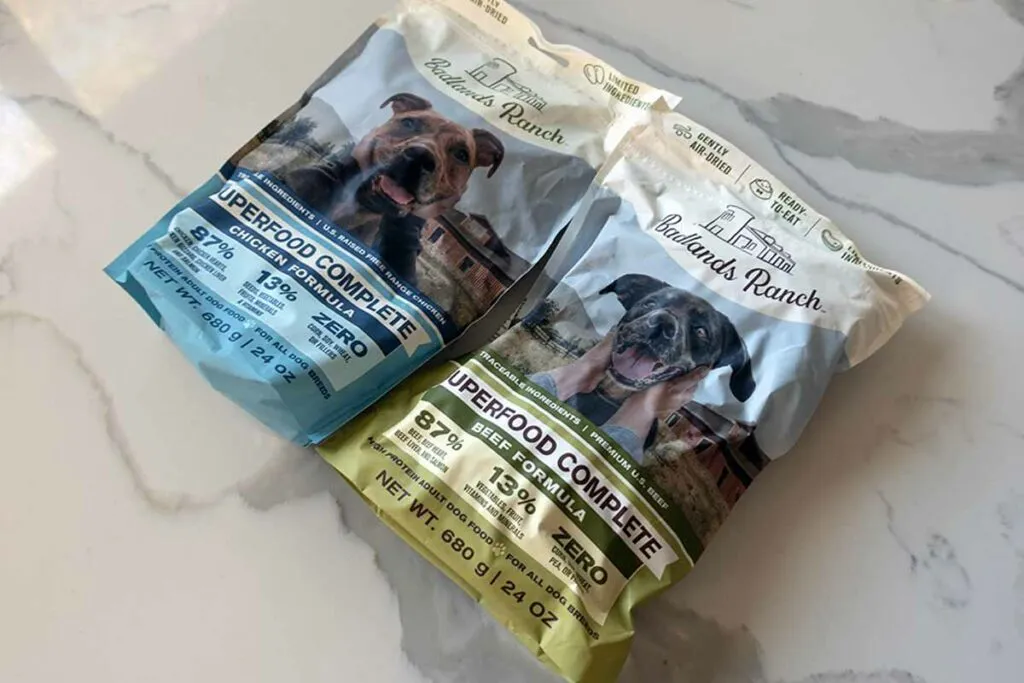 Convenient Badlands Ranch recipes suitable for puppy meal prepping
Convenient Badlands Ranch recipes suitable for puppy meal prepping
Transparency and Brand Reputation
A reputable brand will be transparent about its ingredients, sourcing, manufacturing processes, and nutritional analysis. Look for brands that meet or exceed AAFCO (Association of American Feed Control Officials) nutritional guidelines for “growth” or “all life stages,” which ensures the food is complete and balanced for puppies. Reading dog advisor best dog food recommendations and customer reviews can also provide valuable insights into a brand’s trustworthiness and the effectiveness of their products.
Top Contenders for Best Breed Puppy Dog Food
Based on our criteria, several brands consistently stand out in the “top breed puppy dog food review” category, offering excellent nutrition tailored for growing canines.
Royal Canin Puppy Food: Breed-Specific Formulas
Royal Canin is well-regarded for its extensive line of breed-specific and size-specific puppy formulas. They conduct extensive research to develop diets that cater to the unique needs of different breeds and sizes, from small breed puppies requiring high energy density to large breed puppies needing controlled growth. Their formulas focus on precise nutrient levels, digestible proteins, and antioxidants for immune support. Many pet owners appreciate the tailored approach, which can be particularly beneficial for specific Royal Canin puppy food reviews often highlight the positive impact on their puppies’ health and development.
Wellness Core Puppy Food: Grain-Free, Nutrient-Dense Options
Wellness Core offers several grain-free puppy food options known for their high-quality protein sources, balanced fats, and inclusion of “superfoods.” Their formulas typically include deboned meats, healthy vegetables, and fruits, fortified with probiotics for digestive health and DHA for cognitive development. For pet parents seeking a grain-free diet for their puppies, Wellness Core is a strong contender. Reviews for Wellness Core dog food reviews uk and globally often praise its wholesome ingredients and the visible health benefits it provides.
Nutro Max Puppy Food: Natural Ingredients and Affordability
Nutro Max provides puppy food options that prioritize natural ingredients without artificial colors, flavors, or preservatives. Their formulas are often more budget-friendly than some premium brands while still maintaining a strong nutritional profile. They offer various protein sources and include essential nutrients for growth, making them a solid choice for those seeking quality and value. Many Nutro Max dog food reviews commend its reliable nutrition and accessibility.
Specialized Options: Air-Dried and Raw Puppy Foods
For pet parents looking beyond traditional kibble, specialized options like air-dried and raw puppy foods are gaining popularity. Brands that utilize gentle air-drying or freeze-drying methods, such as Badlands Ranch for its adult formulas, aim to preserve the nutritional integrity of ingredients, similar to a raw diet but with added convenience. These methods often result in a highly palatable, nutrient-dense product. If a brand offers a puppy-specific air-dried or freeze-dried line, it can be an excellent choice for supporting digestion, skin and coat health, and overall vitality. When considering raw dog food options or air-dried foods, ensure the product is complete and balanced for puppies according to AAFCO standards and discuss with your vet. These options, while often more expensive, can provide exceptional nutrition for discerning puppy owners.
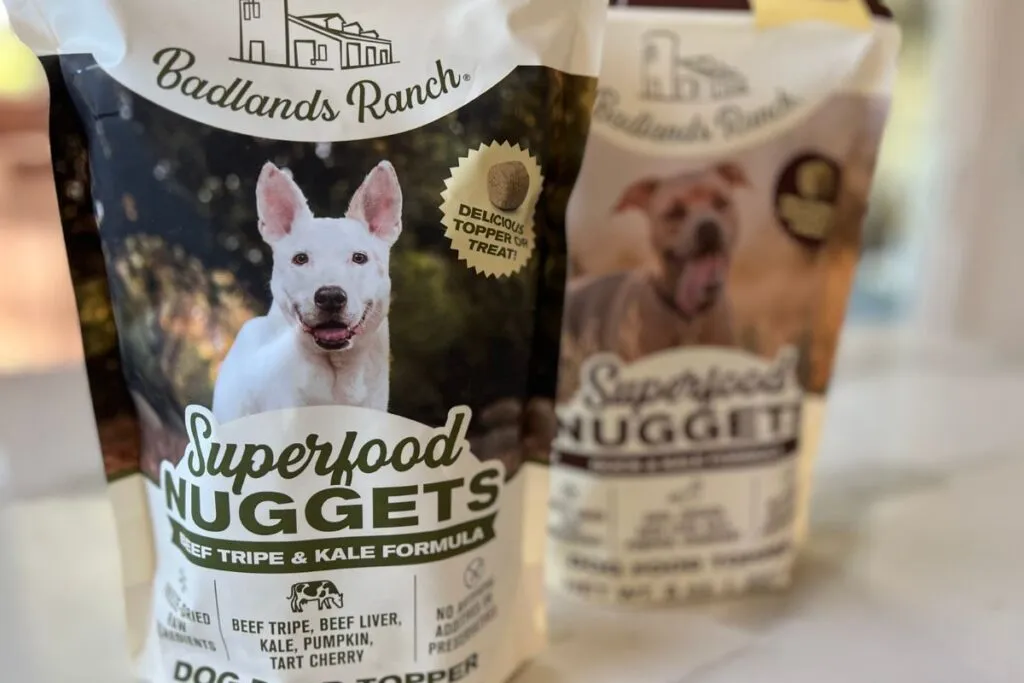 High-quality air-dried dog food nuggets for growing puppies
High-quality air-dried dog food nuggets for growing puppies
Other Considerations
While the above are popular choices, always cross-reference with your veterinarian and specific breed guidelines. For instance, some purebred breeders recommend specific brands based on their experience with their lines. Additionally, factors like the protein content, the presence of probiotics, and the source of ingredients (e.g., sustainably sourced, locally grown) might influence your final choice.
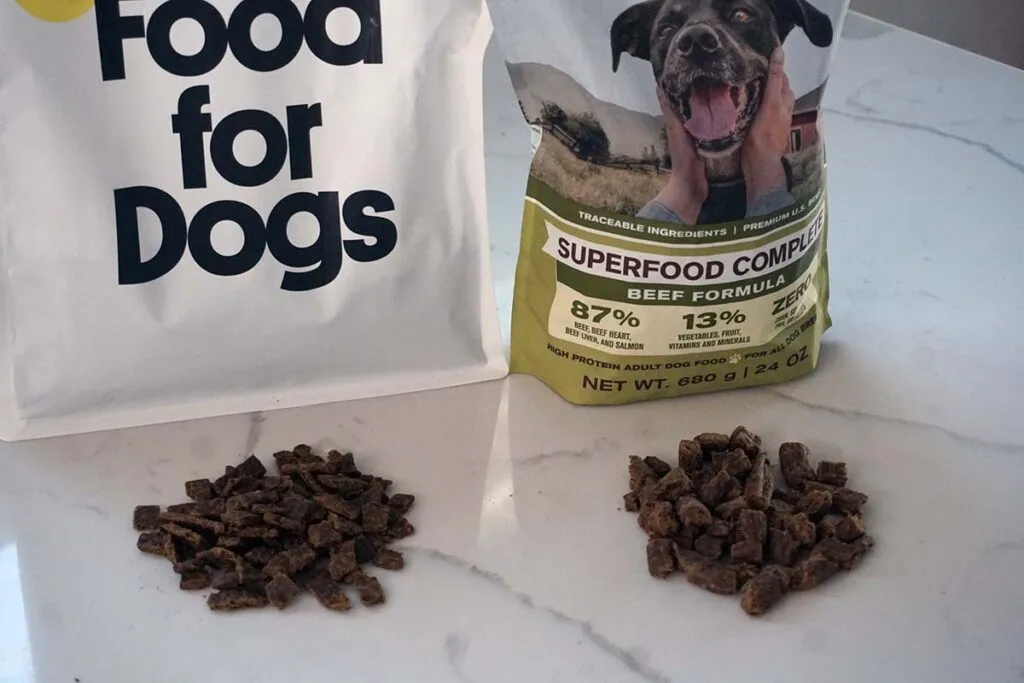 Comparing different brands of top breed puppy dog food
Comparing different brands of top breed puppy dog food
Making the Best Choice for Your Puppy
Choosing the right puppy food is a significant decision that impacts your dog’s long-term health. Here’s how to finalize your choice.
Consulting Your Veterinarian
Your veterinarian is your most trusted resource. They can offer personalized advice based on your puppy’s breed, size, health history, and any specific dietary needs or sensitivities. They can guide you through the best food choices, feeding schedules, and appropriate portion sizes to ensure optimal growth without over or underfeeding. Always consult your vet before making significant changes to your puppy’s diet.
Reading Labels: AAFCO and Ingredient List
Familiarize yourself with pet food labels. Look for an AAFCO statement that indicates the food is “complete and balanced for growth” or “for all life stages.” This assures the food meets the minimum nutritional requirements for puppies. Carefully examine the ingredient list:
- Top ingredients: Should be whole, identifiable protein sources (e.g., chicken, lamb, salmon).
- Avoid: Generic “meat by-products,” artificial colors, flavors, or excessive fillers.
- Key nutrients: Ensure adequate levels of DHA, Omega fatty acids, and essential vitamins and minerals.
Monitoring Your Puppy’s Response
Once you’ve chosen a food, introduce it gradually over 7-10 days to prevent digestive upset. Monitor your puppy’s response closely:
- Energy levels: Should be consistent and appropriate for their age.
- Stool quality: Firm and well-formed stools indicate good digestion.
- Coat condition: A shiny, healthy coat is a sign of good nutrition.
- Weight gain: Should be steady and appropriate for their breed and age, avoiding both obesity and malnourishment.
If you notice any adverse reactions or have concerns, contact your veterinarian immediately.
Conclusion
Selecting the ideal “top breed puppy dog food review” is a foundational step in ensuring your canine companion thrives from puppyhood into adulthood. It requires a thoughtful approach, understanding the specific nutritional demands of growing dogs, and carefully evaluating food options based on ingredient quality, nutritional balance, digestibility, and brand transparency. By prioritizing high-quality ingredients, considering breed-specific needs, and consulting with your veterinarian, you can provide a diet that supports optimal growth, builds a strong immune system, and fosters vibrant health. Remember, a healthy start paves the way for a happy, long life with your beloved pet. Continue to educate yourself, observe your puppy, and adjust their diet as needed, always aiming for the best possible nutritional support.
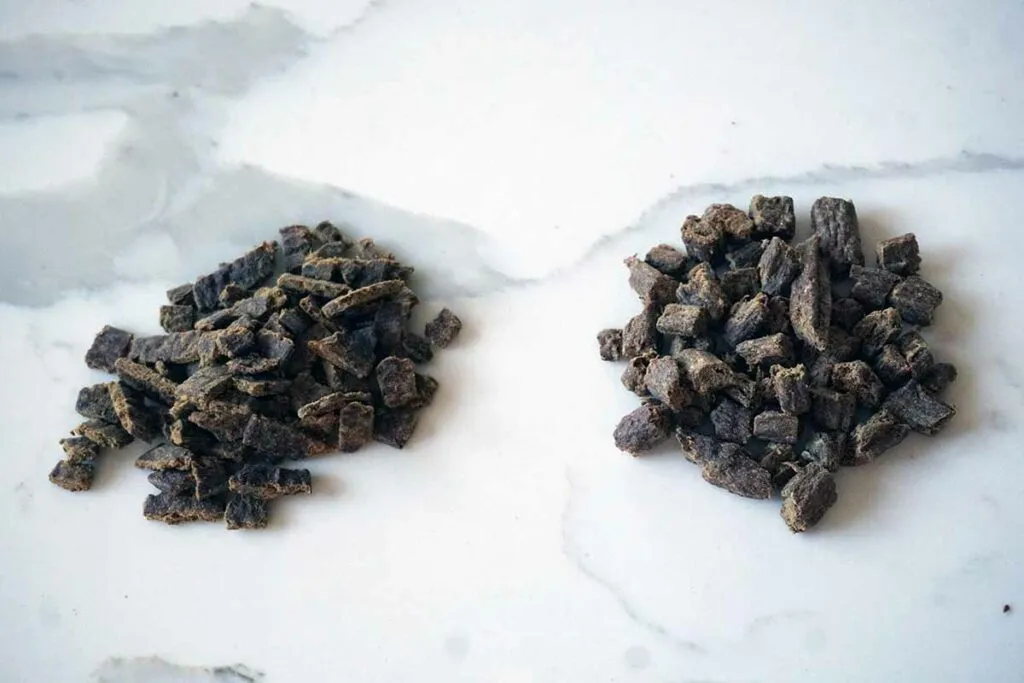 Final selection of the best top breed puppy dog food
Final selection of the best top breed puppy dog food
